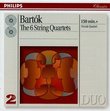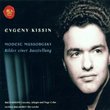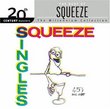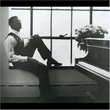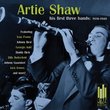| All Artists: Camille Saint-Saens, Antonin Dvorak, Jacqueline Du Pre Title: Jacqueline du Pré plays Dvorák & Saint-Saëns Members Wishing: 2 Total Copies: 0 Label: Teldec Original Release Date: 1/1/1967 Re-Release Date: 2/20/2001 Genre: Classical Styles: Forms & Genres, Concertos, Instruments, Strings, Symphonies Number of Discs: 1 SwapaCD Credits: 1 UPC: 685738534029 |
Search - Camille Saint-Saens, Antonin Dvorak, Jacqueline Du Pre :: Jacqueline du Pré plays Dvorák & Saint-Saëns
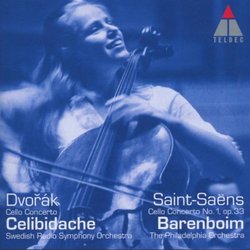 | Camille Saint-Saens, Antonin Dvorak, Jacqueline Du Pre Jacqueline du Pré plays Dvorák & Saint-Saëns Genre: Classical
This disc, recorded live toward the end of Jacqueline du Pré's grievously short career, displays both her irresistible magic--the sumptuous, warm tone, the spontaneous immediacy of expression, the technical and emotio... more » |
Larger Image |
CD DetailsSynopsis
Amazon.com This disc, recorded live toward the end of Jacqueline du Pré's grievously short career, displays both her irresistible magic--the sumptuous, warm tone, the spontaneous immediacy of expression, the technical and emotional risk-taking born of total faith in her talent and musical instincts--and her unbridled excesses: the liberties, the extreme tempi and tempo changes, the passionate abandon, the incessant slow, sentimental slides. These would be intolerable in a performer whose playing and personality had not been inexorably affected by personal tragedy, making it impossible to listen to her objectively. The Saint-Saëns is very fast, brilliant, and impetuous, with slashing accents and attacks, but the slow section is charmingly whimsical. Barenboim and the Philadelphians support her admirably. Du Pré's Dvorák is very expressive, with sometimes throbbing intensity, but the performance is surely the longest in human memory, though the booklet claims she did not resort to unduly slow tempi to achieve her effects. A check of the timings on other recordings(Fournier, with the same conductor, Casals, Navarra, Ma, Feuermann, and Wispelway) reveals differences of three and four minutes per movement. In truth, she milks the music; what saves her idiosyncratic approach is the utter emotional honesty behind the exaggerations. The orchestra is fabulous. Achieving extraordinary transparency, Celibidache brings out generally obscured lines and details; the winds are stunning. Du Pré's name does not appear on the cover picture, but her beauty, vitality, and radiant smile are enough to identify her--and break the heart. --Edith Eisler Similar CDsSimilarly Requested CDs
|
CD ReviewsDu Pre at her most energetic P. Rah | Sion, Switzerland | 04/30/2001 (5 out of 5 stars) "This is a most extraordinary release. Here one can hear Jacqueline du Pre at her most inspired, often sacrificing beauty of sound for drama. But the scratchy bow strokes or missed notes on the whole are not of great concern. When performances are as inspired (and indeed inspring) as this, one just enjoys the music. The Saint-Saens concerto opens the disc, and from the outset we hear the strong rapport between the soloist, conductor and orchestra, in here the Philadelphia Orchestra, who respond with enthusiasm. The concerto is not a major work, at only 19 minutes. But in du Pre's hands, it is a piece that does sound like a significant work. She recorded it comercially for EMI in 1968. I love the performance, but here it is even more impressive. Pablo Casals described it as "a storm interrupted by passages of great calm and peace." Du Pre seems to take note of this quote, and what we get is a very volatile performance, tempi and dynamics fluctuating like an unpredictable storm. In this performance she used her 1970 Peresson cello, to great effect. Barenboim conducts with vigour, even more than in the 1968 version. The sound is very clean for a live radio recording from 1971. The first movement is much more volatile than the 1968 version, which doesn't come as a total surprise as du Pre tended to understate a little in the studio. The second movement is taken at a brisker pace than in the 1968 studio version (the tempo in the second movement of the studio recording is far too slow for an Allegretto). The third movement is also faster than the 1968 version, and it has you on the edge of your seat, because the playing is so full of adrenalin, and she often takes very high risks but always ends up on the right side. No cellist plays like that nowadays. In this recording, the cello is placed very forward, enabling the listener to hear the minutest detail clearly. But the orchestra is miked less forward than the cello, which gives a slight imbalance in the sound picture. Then comes the great Dvorak concerto. And boy, was I struck by it! I have heard four different Dvorak concerto perfomances by du Pre: The live 1970 performance from Wellington, New Zealand, of which I have a private tape, the 1970 Chicago studio performance, which is available generally, the 1969 London Proms recording, then this 1967 performance. Of the four, I have to say that this is the most impassioned performance. She uses her famous 'Davydov' cello (in the other three recordings, she used a Goffriller cello), and really pushes the capacity of the instrument (as noted in the CD booklet). Throughout the performance one can hear many scratches and buzzes from the strings caused by extra pressure du Pre exerted upon the instrument. Here is du Pre at her most energetic, her tone beautifully burnished and the volume of her tone just incredible. Here one realises what people meant when they accused her of being too excessively emotional, but I just love it! Yes, she is extremely emotional in some passages, but what is music about? I think it is about conveying emotions, and the Dvorak is a pretty emotional and dramtic piece anyway. Her use of rubato is wonderful, with broad phrasings which suits this piece. She creates a sense of nostalgia in the coda of the last movement that is very touching. This is a Dvorak concerto performance that will not be surpassed in terms of its emotional passion. It isn't the most technically accurate, as it is a live performance, but certainly the most joyfully passionate. Celibidache provides wonderful accompaniment from his orchestra, which copes very well to du Pre's fluctuations of tempi and liberal use of rubato. The wind section is particularly good. The conductor's tempi are slow compared with other performances, but it doesn't sound laboured, and because of the broader tempi, the soloist can afford to be grand in her phrasings. Only occasionally the orchestra fails to come in at the right time, but that is a trivial matter. No one performance was the same. Du Pre couldn't do such a thing as playing a piece the same way, and in this sense she was a great improviser, but without changing the notes (very much like Martha Argerich). To my annoyance, Teldec chose to edit out the applause. People generally don't like applause at the end of a live recording, but here is an exception. When the performances are as inspired as this, applause would have made it that more atmospheric. The remastered sound throughout is wonderfully vivid. Her recordings are all too few and I revel in the issues of new previously-unreleased recordings, as her discography always needs filling-up. This is a valuable addition to the du Pre discography, and a must for any du Pre fan. I have said that about other du Pre discs, but this REALLY is a must!" Magical gianluigi pelloni | UK | 10/13/2004 (5 out of 5 stars) "the collaboration between Jacqueline Dupre and Celibidache is just magical. Their shared abandon to the lirical, nostalgic beauty of the concert, combined with their oustanding command of musical detail, infuse this performance of a unique magic. Only Rostropovich with Talich and Casals with Szell (or anybody else for that matter)have touched this listener so deeply in the same concerto." The Best Ever Dvorak Cello Ever MR WT MAKHATHINI | Durban, South Africa | 01/10/2005 (5 out of 5 stars) "The review by Paul Rah from Switzerland nailed it to the point. I got this from Amazon.com last few weeks back and the first thing that struck me was the sudden emergency in Ma Du Pre's tone on the Cammille Saint Saens Concerto & I knew I was in for something magical.I have never heard a cello being bowed like that very lush,spontaneous almost beyond its limits. The Dvorak concerto also struck me to the heart especially the 2nd movement.The sumptous ochestra and Cello are just amazing.I think the Dvorak Cello by Jackie will down as the best ever.One thing that I also noticed was the the best quality of the sound for an 1967 and 1970 performances one wonders how did the engineers get it right, its perfect.Surely glimses of eternity is what audience got in those live performances.I would not like to say more that what Paul Rah has said already.The fact that im the 3rd person to review this magnificent piece of music is unbelievable to me, may be people have not heard about the greatest Cellist that ever lived."
|

 Track Listings (6) - Disc #1
Track Listings (6) - Disc #1
